The Mainland Affairs Council (MAC) yesterday released a transcript of President Ma Ying-jeou’s (馬英九) conversation with Chinese President Xi Jinping (習近平) at their closed-door meeting in Singapore on Saturday, as the landmark meeting continues to be marred by accusations of backroom dealings and the erosion of Taiwan’s sovereignty claims.
Ma delivered a 20-minute speech that addressed five areas: creating sustainable cross-strait peace and prosperity based on the so-called “1992 consensus”; reducing hostility and tackling disputes peacefully; expanding cross-strait exchanges to create win-win scenarios; establishing a cross-strait hotline for urgent issues; and reinvigorating the Zhonghua minzu (Chinese ethnic group, 中華民族) through cross-strait cooperation.
The “1992 consensus” refers to a tacit understanding reached during cross-strait talks in 1992 that both Taiwan and China acknowledge that there is “one China,” with each side having its own interpretation of what “China” means.
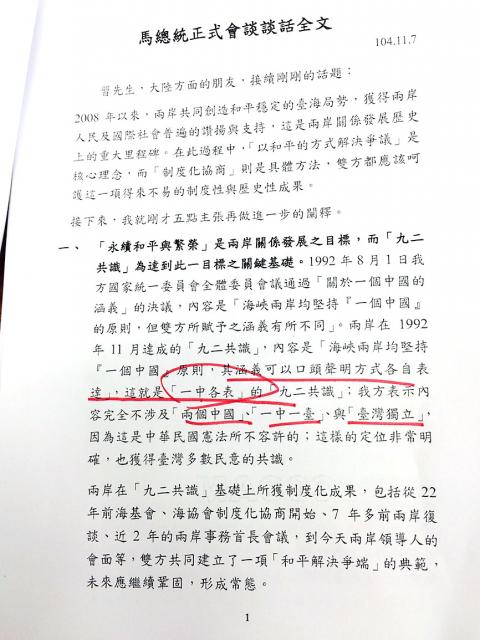
Photo: CNA
Former Mainland Affairs Council chairman Su Chi (蘇起) in 2006 admitted that he made up the term in 2000 while still in office, but it remains the Chinese Nationalist Party’s (KMT) cornerstone for dialogue with China.
“On Aug. 1, 1992, our [now-defunct] National Unification Council unanimously passed a resolution regarding the meaning of ‘one China’: both sides of the Taiwan Strait will adhere to the ‘one China’ principle, but will have different definitions of the term,” Ma said, according to the transcript.
Ma went on to say that “the ‘1992 consensus’ reached by the two sides in November 1992 stipulates that both sides of the Taiwan Strait will adhere to the ‘one China’ principle, but can verbally state their respective interpretations of what the term means.”
Taiwan’s interpretation does not include the terms “two Chinas,” “one China, one Taiwan” or “Taiwanese independence,” all of which are prohibited by the Republic of China (ROC) Constitution, Ma said.
“This position is rather unequivocal and is supported by the majority of Taiwanese,” Ma said.
The transcript was released after Ma defended his omission of the “different interpretations” component, which he often touts, when discussing the “1992 consensus” during his opening remarks at the meeting by saying it was mentioned during the closed-door session.
Ma said he brought up the Constitution twice with Xi, as well as one mention each of the ROC and “one China, different interpretations.”
Ma also mentioned the Constitution when speaking of the 1991 abolishment of the Temporary Provisions Effective During the Period of Communist Rebellion (動員戡亂時期臨時條款), putting an end to the government treating the People’s Republic of China as a rebellious entity.
That was followed by the implementation of the Act Governing Relations Between the People of the Taiwan Area and the Mainland Area (臺灣地區與大陸地區人民關係條例) in 1992, which institutionalized cross-strait negotiations, Ma said.
Regarding Chinese military deployments targeting Taiwan, Ma said that since the 23 cross-strait pacts signed by his administration were based on “peace” and were designed to help “maintain peace,” they could all be deemed peace treaties in a broad sense.
“I would like to explain to Mr Xi that recent media reports of [Chinese] military exercises at the Zhurihe training base and missiles [aimed at Taiwan] have given opposition parties leverage to criticize cross-strait ties,” Ma said.
“If possible, some well-intended actions by your side should help abate this sort of unnecessary criticism,” Ma added.
Turning to the growing predicaments faced by Taiwan in participating in international events, Ma said meaningful participation in the international community has always been the Taiwanese public’s greatest aspiration.
“The viable diplomatic platform promoted by our side over the past seven years has helped to create a virtuous cycle in cross-strait relations,” Ma said.
“However, this cycle has yet to reach its full potential, as evidenced by the UN recently refusing Taiwanese carrying [ROC] passports entry to its headquarters,” Ma added.
Impediments have also been encountered by Taiwanese specialists seeking to attend meetings held by non-governmental organizations and by the government in its attempts to join bilateral or multilateral economic and trade discussions.
“These circumstances have created a negative perception of Taiwanese, especially those considered to be in the social elite. Both sides should work to reduce hostility and confrontation, beginning from this area,” Ma said.
Ma concluded his speech by urging both sides of the Taiwan Strait to cooperate to create a brighter future for future generations.
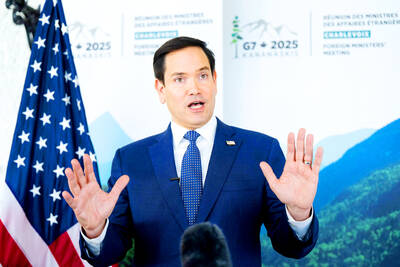
‘CROWN JEWEL’: Washington ‘can delay and deter’ Chinese President Xi Jinping’s plans for Taiwan, but it is ‘a very delicate situation there,’ the secretary of state said US President Donald Trump is opposed to any change to Taiwan’s “status quo” by force or extortion and would maintain that policy, US Secretary of State Marco Rubio told the Hugh Hewitt Show host on Wednesday. The US’ policy is to maintain Taiwan’s “status quo” and to oppose any changes in the situation by force or extortion, Rubio said. Hewitt asked Rubio about the significance of Trump earlier this month speaking with Taiwan Semiconductor Manufacturing Co (台積電) chairman C.C. Wei (魏哲家) at the White House, a meeting that Hewitt described as a “big deal.” Asked whether the meeting was an indication of the
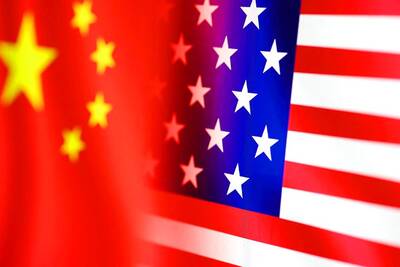
‘RELATIVELY STRONG LANGUAGE’: An expert said the state department has not softened its language on China and was ‘probably a little more Taiwan supportive’ China’s latest drills near Taiwan on Monday were “brazen and irresponsible threats,” a US Department of State spokesperson said on Tuesday, while reiterating Washington’s decades-long support of Taipei. “China cannot credibly claim to be a ‘force for stability in a turbulent world’ while issuing brazen and irresponsible threats toward Taiwan,” the unnamed spokesperson said in an e-mailed response to media queries. Washington’s enduring commitment to Taiwan will continue as it has for 45 years and the US “will continue to support Taiwan in the face of China’s military, economic, informational and diplomatic pressure campaign,” the e-mail said. “Alongside our international partners, we firmly
KAOHSIUNG CEREMONY: The contract chipmaker is planning to build 5 fabs in the southern city to gradually expand its 2-nanometer chip capacity Taiwan Semiconductor Manufacturing Co (TSMC, 台積電), the world’s biggest contract chipmaker, yesterday confirmed that it plans to hold a ceremony on March 31 to unveil a capacity expansion plan for its most advanced 2-nanometer chips in Kaohsiung, demonstrating its commitment to further investment at home. The ceremony is to be hosted by TSMC cochief operating officer Y.P. Chyn (秦永沛). It did not disclose whether Premier Cho Jung-tai (卓榮泰) and high-ranking government officials would attend the ceremony. More details are to be released next week, it said. The chipmaker’s latest move came after its announcement earlier this month of an additional US$100 billion
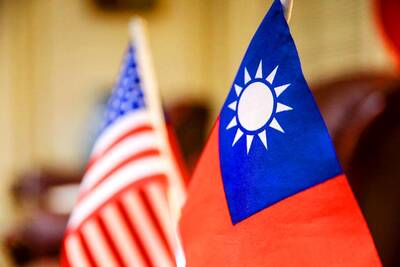
COUNTERING THE PLA: While the US should reinforce its relations with partners and allies, Taiwan must invest in strengthening its defenses as well, Phillip Davidson said If influence in the Indo-Pacific region is one of the US’ core interests, then Taiwan serves as a cornerstone of US economic and security influence in the region, former US Indo-Pacific Command commander admiral Phillip Davidson said on Thursday. “China’s ... strategy is to supplant the US leadership role in the international order ... and they’ve long said ... that they intend to do that by 2050,” Davidson told the National Review Institute’s Ideas Summit in Washington. Davidson said he had previously told US Senate hearings on China’s military activities and possible threats in the Indo-Pacific region that a Chinese invasion of